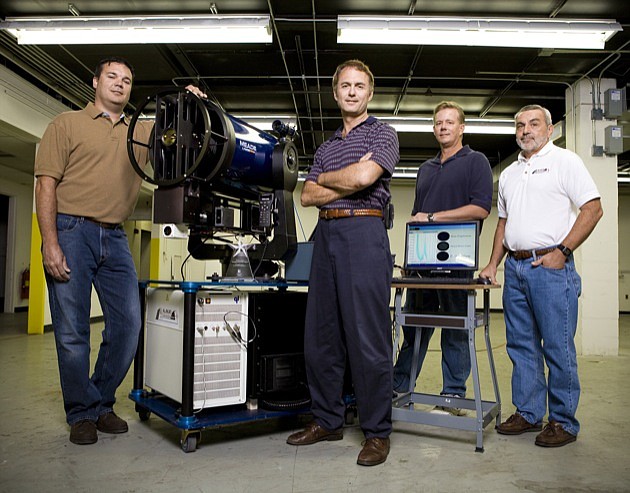- November 26, 2024
-
-
Loading

Loading

Onetime U.S. Army Special Forces commander Ed Dottery led his company into a risky encounter this past summer.
The company, Largo-based Alakai Defense Systems, was asked to put its patented bomb and explosive detection technology to a live test in front of a group of Army higher-ups at Fort Leonard Wood in Missouri. The company's team of specialized engineers, however, had only recently finished an intense upgrade of the products when Dottery got the invitation.
Dottery decided to go for it anyway.
“There was no way we could wait another six months,” says Dottery. “We're not going to wait while our soldiers are out there dying.”
Dottery led nearly the entire 20-employee company on a convoy from Tampa to south-central Missouri, with hundreds of thousands of dollars of gear in tow. Employees demonstrated the product in a series of tests. They then spoke openly with Army personnel about their willingness to change things to fit a specific need or use.
“We do a lot of things most companies do later in a product's lifecycle,” says Dottery. “Most companies wouldn't do it that way.”
The Alakai way certainly works. Annual revenues grew from $500,000 in 2005 to $3 million in 2010. And the growth was stunted on purpose the last two years due to a corporate restructure that took away a chunk of the firm's consulting business. Dottery projects the company will at least surpass $4 million in revenues in 2011.
More proof of success: the Tampa Bay Technology Forum named Alakai its Emerging Technology Company of the Year for 2010. The company also won the state's Governor's Entrepreneurship Award in 2008.
Alakai, which means leadership in Hawaiian, goes by the motto “We were soldiers, our children are soldiers, our mission is to protect the soldier.”
“It's more than a motto,” says Dottery, the co-founder and president. “It's the truth. It's why we do what we do.”
More opportunities
Dottery's gamble in late August in Missouri paid off, he says, because the Army gave Alakai the kind of feedback that will be useful to complete a deal. Says Dottery: “We now have a pretty good feel for what we need.”
The product's best application, says Dottery, is on the battlefield in Iraq and Afghanistan, where improvised explosive devices are one of the leading killers of soldiers. In fact, Alakai deployed its technology just like another Gulf Coast company, Sarasota-based Gryocam Systems, which manufactures cameras that can detect bombs and explosives. Lockheed Martin bought Gyrocam last year.
Dottery and Gyrocam founder Ken Sanborn discussed a partnership of some kind, but they didn't reach a deal before the company was sold. But the premise — to protect battlefield soldiers through technology — clearly connects the firm to military officials.
That connection is why Dottery decided to open a second Alakai office in Fort Leonard Wood. He calls the move the company's biggest competitive advantage because now it's where the customer is, in this case, the U.S. Army. “We aren't near the fort,” says Dottery. “We are on the fort.”
While the Department of Defense is Alakai's main source of revenue right now, Dottery hopes the company will expand its reach in the near future. For starters, the company is in research and development mode for a handheld explosive detection device. That advancement could be a hit with the Department of Homeland Security and its myriad of agencies.
The company will also chase another goal, to build a device that can be a one-source instrument to detect nuclear, radiological, chemical and biological weapons and explosives.
Finally, Dottery realizes there will be opportunities to sell products to non-military users, like police departments and security firms. He recently set up a second entity to handle commercial business like that. But he says the concentration of work will remain will the military for now. “That's where I want to keep the company focused,” says Dottery.
'New and better'
The firm will likely always maintain a focus on soldier protection, especially given Dottery's military background. A native of San Francisco, Dottery graduated from West Point in 1979 and a few years later he was assigned to run a Special Forces unit in the Middle East.
Dottery earned a master's degree in applied physics from Stanford University after he returned home. He taught physics for a time, then returned to West Point to teach and coach the karate team. He later took a job with Lockheed Martin in New Hampshire.
After a few years of the corporate bureaucracy, however, Dottery yearned for a place where he would have more independence and creative freedom. Turns out Dottery's longtime friend and Army buddy, Guy Ontai, a state representative in Hawaii, also sought a business opportunity.
So in 2003 the pair formed Alakai. They launched the business in Largo, at the Young-Rainey Star Center business incubator. (See Business Review, June 13, 2008.)
Ontai has since returned to Hawaii, where he now runs a consulting firm spun-off from Alakai. Dottery, meanwhile, continues to build Alakai into a player in the defense contracting industry. He says the company's ability to develop new and better technology will be a key component to its success.
“These are not Tinkertoys,” says Dottery. “We are out on the bleeding edge.”